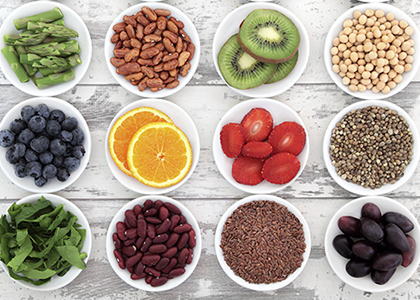
Tips For Plant Based Eating
By Team Reboot
Plant-based diets are becoming all the rage in many parts of our culture, embraced by the public and backed by science.
For any diet or eating pattern, care and attention is required for structuring the optimal nutrient intake based on a variety of personal factors. This goes for everyone, carnivorous meat eaters and animal-based food abstainers alike.
Some Key Nutrients
Let’s take a look at some of the key nutrients for any age and how to get them from delicious 100% plant-based meals!
1. Protein
When we think protein, we often only think of meat, but truth is, many plant foods, like quinoa, chia, hemp seeds, buckwheat, peas, tofu, and certain sprouted grains have all of the essential amino acid building blocks that meat and poultry offer. And thankfully, the old rice & beans myth has been debunked. You don’t need to consume and combine plant foods at the same time to get the required amino acids for a healthy immune system and muscle mass. In fact, many professional athletes are now vegan! TIP: Aim to have protein-rich food with each meal and snack. If you’re on a Reboot and concerned about protein, you can learn more here.
2. Iron
Iron doesn’t just come from red meat either! There are many iron-rich vegetables beyond Popeye’s spinach! Leeks, kale, other dark green leafy veggies, broccoli, quinoa and chia are an excellent choice. It’s important to keep in mind that just because we eat something, doesn’t mean our bodies absorb it properly. Since humans have a different and more efficient absorptive process for iron coming from red meat or chicken vs. kale or leeks, let’s look at how to turn that plant-based plate into an iron-rich vehicle.
Cook in an iron skillet.
Combine iron-based plants with a vitamin C-rich food. The vitamin C will actually interact with the plant-based iron in your gut to essentially form “meat shaped iron” for easier and more efficient absorption. We know our plant-based iron list but beyond oranges, high vitamin C veggies include peppers and cauliflower.
Here are some delicious examples: Creamy Broccoli & Cauliflower Soup , Coconut Cauliflower-Kale Puree, Fiesta Stuffed Peppers, Mean Green Juice
3. Calcium
Calcium is a mineral that is important for more than just healthy bones. Calcium is used throughout the body and plays a role in blood clotting and muscle and nerve function, including keeping our heart healthy.The amount of calcium we truly need for health is being examined closely and the “norm” of 1200 mg per day is being debunked. Read more on The Truth About Calcium here. Calcium is abundant in the plant-based world. While some newer, non-dairy products are fortified, many foods are naturally rich in this important mineral.
4. Vegetables, Nuts, Beans & Other Plant Foods
*Boiled greens have higher amounts of calcium available for absorption, but most of us eat our greens raw. For example, 1 cup of boiled kale has about twice the calcium of raw; 179 mg vs. 90 mg.
Beans (1 cup, black, kidney, cannellini, navy) = 175 mg
Tofu ( ¼ block) = 160 mg
Turnip Greens (1 cup, raw) = 105 mg
Kale ( 1 cup, raw) = 90 mg
Almonds (1/4 cup, unsalted) = 70 mg
Beet Greens (1 cup, raw) = 45 mg
Broccoli ( 1cup, raw) = 41 mg
Spinach (1 cup, raw) = 30 mg
5. Vitamin B12
Vitamin B12 (aka cobalamin), is a water-soluble vitamin that plays a key role in the normal functioning of the brain and nervous system, the formation of healthy red blood cells, and is involved in the metabolism of every cell of the human body, especially affecting DNA synthesis and regulation, fatty acid synthesis and energy production. Read more on B12 here.Vitamin B12 is also stored in the body, so not all who forgo animal foods will become instantaneously deficient. There are reliable blood tests to determine if you are B12 deficient or need a supplement, so speak with your doctor if you have concerns.Here are some ways that plant-based eaters can keep their B12 intake up:
Eggs – preferably organic or local, for those vegetarians who include this food
Seafood – preferably local and wild, for the pescatarians out there. This may offer an advantage in protection against developing colon cancer.
Miso and nori – Try these delicious Nori Wraps or Reboot Friendly Sushi Wraps.
Spirulina – Add to your favorite smoothie, like this Green Superfood Smoothie
6. Calories
There are SO many healthy, high calorie foods – think of all the “healthy fats” like avocado, nuts, plant-based oils like walnut, evoo, coconut, etc. No need for loading on greasy dairy products or high fat steak to hit your calorie goals. Toss some chia and avocado in your smoothie or salad. Seriously, add avocado to, well, just about anything, except your juicer!!
Embarking on a vegetarian or vegan adventure together as a family is a wonderful way to explore new foods, enhance nutrition and health and most importantly, support each other.